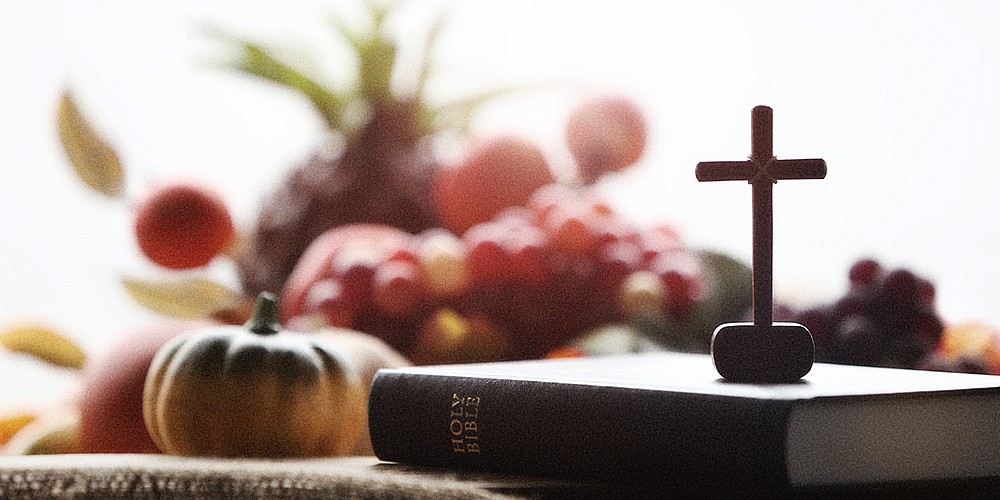On Thanksgiving Day in 1944, a young American platoon sergeant named Mac St. Johns led his men on a scouting mission in the French countryside. They were looking for German soldiers known to be in the area. Heading toward a crossroads under the faint light of dawn, Mac “stood stark still” and argued with himself about what to do next. He knew that he should have his men “fan out so that they could move with the cover of the trees” in the surrounding forest. But a voice in his head told him not to do so. After some hesitation, he chose to walk his men down the road in a single column. Though they were exposed, no Germans fired. In fact, Mac and his men encountered no German resistance near the crossroads at all.
Turning around to return to camp, they quickly realized how close they had come to death. Nailed to the backs of the trees, German signs warned, “Minen!” Had they moved through the woods earlier that morning, they would have been “blown to bits.”
Weeks later in mid-December, Mac got a letter from his mother. “Can you remember where you were on Thanksgiving Day?” she asked. His mother explained that she had awakened just after midnight with a sense of terror. “I had a strong feeling that you were in great danger. When I opened my Bible, a phrase in Second Chronicles [20:17] gleamed on the page: ‘Stand ye still and see the salvation of the Lord with you…’” Stand…ye…still. Mac had definitely received his mother’s Thanksgiving message.
I came across Mac’s story in this collection of inspiring Thanksgiving miracles. It spoke to me because I have had my share of similar moments in life — when a whisper stopped me in my tracks and moved me in a different direction. In each of those instances, the choice before me seemed small, but the voice inside my head insisted that it would be consequential. That voice has always been right. So it is in this world: sometimes a single step is our undoing, and sometimes a single step is our salvation. When you hear an unexpected whisper, it’s best to listen.
We don’t always listen, though, do we? Sometimes we ignore any misgivings and continue down our original path. And when those choices burn us down the road, we have an even more consequential decision to make: do we let our past mistakes define our futures, or do we use our newly gained wisdom to defeat challenges yet to come?
It is not easy to admit when we’ve been wrong. It is even harder to find peace when our bad decisions harm others. It is tempting to cover up one bad choice with another. You do that enough times, though, and you eventually realize that you’ve done nothing but bury important truths.
When I was younger, a wise man told me to be thankful for my regrets. “Thankful?” I remember thinking in disbelief. I preferred to carry my regrets like weights around my neck. I refused to let them go. Living like that means living with inconsolable pain. But there was something else that old philosopher said that stuck with me: your regrets give you a chance to be a better person today than you were yesterday. Be thankful for your regrets, he argued, because they are the instruments that mold our character. Use your pain to grow, or your pain will one day use you up. Some of the best people around us have profound regrets. Often, it is their profound regret that has shaped them into such morally excellent people.
Be thankful for the hard lessons. Wisdom is rarely obtained with ease. If it were, everyone around us would be wise. Wise people stand out because wisdom comes with a cost. We humans all suffer in one form or another. Only some of us, however, learn to use that suffering to become better versions of ourselves.
Sometimes bits of wisdom seem contradictory. In a single evening with friends, you might hear one argue, “People never change,” and another insist, “People do change.” Are our natures set in stone from the moment we enter this world, or are we capable of real, substantial growth? I have always been fond of what the Ancient Greek philosopher Heraclitus had to say on the matter: “A man’s character is his fate.” Who we are affects our decisions, and our decisions ultimately affect our futures.
But think about the advice from the old wise man I mentioned above who encouraged me to be thankful for my regrets. If our character is shaped by how we handle our regrets, then surely we have some measure of control over our fates. Perhaps the more we understand about ourselves, the more capable we become of creating our own futures.
There have been only a few times in my life when I was near someone who gave me the shivers. If you’ve ever found yourself around such a person, it is difficult not to believe in the existence of evil. Aside from truly evil human beings, though, most people are capable of doing both bad and good things. You can take a boy without a family, give him a gun, and tell him to protect his neighborhood gang. Awful acts soon follow. You can give a boy a family, help him learn from his mistakes, and encourage him to protect his community. The same boy becomes a selfless police officer. Often, it is not a question of whether we humans change or not but rather how we channel our inherent natures. When we are wise enough to learn from our mistakes and listen to those who wish to help us, we become better people.
As Mac St. Johns’s Thanksgiving Day story from WWII shows, sometimes the difference between life and death is a steadfast faith in God. Will we listen when He whispers, or will we walk the other way? Will we allow Him to shape our character, or will we insist on doing so without His help? So much is at stake. At any moment, we might face the most consequential decision of our lives.
As we celebrate Thanksgiving this year, many of us are also celebrating President Trump’s election victory. Something has been rotten in America for quite some time. Our national borders, shared history, and common love for freedom have been disappearing. Multinational corporations and international bureaucrats have long exerted more influence over our country’s direction than the people who call America home. Our national debt is unsustainable. Our government is corrupt. Our Constitution is ignored. Our Union is divided. Our culture is vulgar. Our moral compass is broken. President Trump’s return to office offers the prospect of needed change.
The questions now are straightforward: will we learn from our past mistakes? Will we admit that we have sometimes taken the wrong path as a nation, caused unnecessary harm, and hurt ourselves? Will we stop covering up one bad choice with another? Will we make use of our suffering and grow stronger? Will we learn from painful experiences and gain wisdom? Will we choose to be thankful for our many regrets?
A country’s character is its fate, too. Any country is capable of both tremendous good and shocking atrocity. Any country can nurture its people’s best impulses or exacerbate its people’s worst instincts. Any country can submit to evil or seek God’s guidance and forgiveness.
If we have been given a second chance this year, let us be supremely grateful. Let us be penitent. Let us demonstrate wisdom. Let us harness the best parts of our natures. Let this be the first of many joyous Thanksgivings to come. Above all else: let us be still…and listen.
Don’t just survive — THRIVE! Prepper All-Naturals has freeze-dried steaks for long-term storage. Don’t wait for food shortages to get worse. Stock up today. Use promo code “jdr” at checkout for 35% off!



Thanks for this message!
I too NEVER miss an opinion piece by JB Shurk on American Thinker.
Bless you JD.
Ken
Western NC